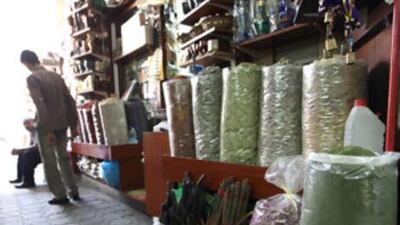While Mahmoud Ahmadinejad strikes a defiant tone about the sanctions levied on his country, Iranian businessmen in Dubai are complaining that strict enforcement in the UAE is choking small companies and traders. "Iran has been under sanctions for 30 years. Our exchange with Europe is about US$23 billion (Dh84bn), which makes no problem if it is removed from Iran's economy," the Iranian president told reporters in New York this week.
The UAE also made its case to the New York media recently, with Yousef al Otaiba, the country's envoy to Washington, saying the government had taken "vigorous action" to enforce UN sanctions on Iran. In a letter to The New York Times, Mr al Otaiba wrote that the UAE, besides freezing bank accounts and financial assets of companies and individuals suspected of supporting proliferation and weapons development, "has closed down dozens of international and local companies involved in money laundering and the transshipment of dual-use materials".
Dozens of ships and hundreds of shipments suspected of violating the sanctions had been stopped or inspected, he wrote, and the UAE was sharing intelligence with international authorities to intercept "sensitive transshipments". In June, the UN Security Council passed a fourth round of sanctions against Iran, followed by unilateral sanctions from the United States and the European Union. The unilateral sanctions have had the greatest impact on Iranian traders, who say local and international banks are denying them letters of credit, which enable them to ship simple materials such as foodstuffs to Iran.
"We observe the banks in the UAE, whether foreign or local banks, are applying more and more daily restrictions to the Iranian traders and businesses," said Morteza Masoumzadeh, the vice president of the Iranian Business Council (IBC) in Dubai and managing director of Jumbo Line, a shipping agency. "How is it possible that a bank in the UAE is not opening a letter of credit for us to import 10,000 tonnes of rice from Thailand to Bandar Abbas? Rice has nothing to do with nuclear energy, nothing to do with Revolutionary Guards," he said.
A letter of credit is a bank document that assures sellers that a trading partner will pay for imported goods. It is used frequently in international trade. At the moment, Iranian traders here cannot get letters of credit and European insurers are banned from insuring cargo going to Iran, said Abbas Bolurfrushan, the managing director of Arya Insurance and an ex-president of the IBC. He has been in the UAE for 28 years. Letters of credit opened by Iranian banks, meanwhile, are essentially worthless. The US limits access to American financial markets for entities that violate its unilateral sanctions, which target the Islamic Revolutionary Guard Corps - an arm of Iran's military said to be increasingly in control of policy - and its affiliates.
Unilateral sanctions have made circumstances much more difficult. "As soon as the American sanctions came into effect unilaterally, and then the Europeans followed and then the Japanese followed and even the South Koreans, it became tighter for Iranian business people to operate," said Mr Bolurfrushan. Since many Iranian companies are set up here with the sole aim of serving the Iranian market, trade licences that have an Iranian name on them trigger concern at banks, said Mr Masoumzadeh.
He said banking activity had slowed because Iranian businesses could not transfer money in euros or dollars to Iran. Many of the traders have no ties to the Iranian government or the Revolutionary Guard, businessmen argue. "All the Iranians in Dubai are really puzzled because they are private sector and they have nothing to do with the government of Iran and they are the actual victims of these sanctions," Mr Bolurfrushan said.
Iran's new ambassador to the UAE said that while he understood the UAE must adhere to international measures, he hoped the Emirates would treat Iran in a "brotherly" manner. "We are not satisfied or happy with what the UN has decided. But we also don't blame our brothers in the UAE," Mohammed Reza Fayyaz said. "Brothers help each other, forgive each other and, in difficult situations, they hold each other's hands for help," he said.
There are 8,000 Iranian businesses in Dubai, and Iran's trade with Dubai is estimated to be about $10billion a year. Nader Ghadessi, the owner of Award Technology, which trades in industrial goods used in oil and gas and filtration and does business with Iran, said Iranian-owned businesses that did not deal with Iran had not been affected, but those that did had suffered from a decline in cash transfers and difficulties in securing letters of credit.
Suppliers of legitimate goods had also become hesitant to sell products to be exported to Iran, he added, and goods going to Iran were encountering more rigorous customs inspections. "We respect the UAE customs decision to do inspections to make sure that only allowed goods are going to Iran, but what we need is to have some guidelines to help them speed up things," said Mr Ghadessi, who came to Dubai in 1997.
The UAE had all the tools to locate "illicit" businesses, he said. "This is where we trust the UAE Government will protect the legitimate and take action against the illegitimate," he said. "Looking at the history of Iranians in Dubai, no one can doubt the contribution of Iranians to what made Dubai a huge success. They are committed to helping the recovery too. Political issues shall not affect this."
Mr Masoumzadeh said the UAE risked losing Iranian businessmen who might decide to set up shop in Malaysia or Turkey instead, "undermining the business foundations which were laid down over 60 years ago".
kshaheen@thenational.ae


